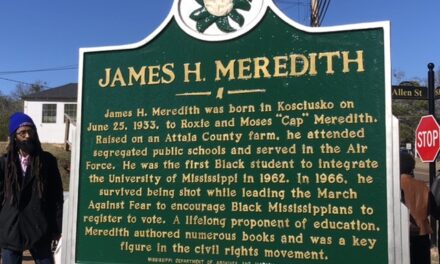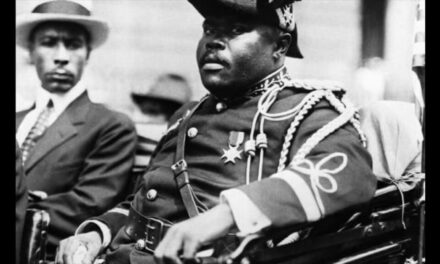
All U.S. citizens should safeguard the rights and privileges of being an American. However, extending birthright citizenship to everyone born in the United States raises important concerns and diminishes the meaning and value of being a citizen.
Black people and Black legacy organizations, in particular, shouldn’t remain silent about courageously advocating to end birthright citizenship.
A few days ago, President Trump signed an executive order, “Protecting the Meaning and Value of American Citizenship,” to end birthright citizenship. This legal principle, protected in the U.S. Constitution, guarantees that anyone born in the United States automatically becomes an American citizen, regardless of their parents’ nationality.
As stated in the executive order, citizenship is a “priceless and profound gift.” From a justice standpoint, Black people, collectively, haven’t been fully integrated into society despite having earned and fought for the right to be recognized as U.S. citizens. The struggle continues even with the enactment of the 14th Amendment, which was specifically aimed at ensuring that newly freed Black Americans would be recognized as citizens after the Civil War ended three years earlier in 1865.
Granting citizenship to all individuals born in the country — while providing undocumented immigrants with specific benefits and resources — often placing them in communities that are already disproportionately impacted by poverty, and are frequently strapped for resources without acknowledging this ongoing struggle — feels like a slap in the face to many Americans.
Proponents argue that birthright citizenship promotes inclusivity and social cohesion by ensuring that all individuals born in this country can claim citizenship, fostering a sense of belonging, and offering protection for children born to undocumented immigrants.
Those opposed argue that birthright citizenship attracts undocumented immigrants seeking to exploit the provision, incentivizing them to have babies in the U.S. They use it to create a pathway to gain legal residency as parents.
While many immigrants provide valuable contributions to this country, some criminal problems have surfaced from others illegally crossing the border into the United States, prompting immigration reform and national security. Also, what about individuals who arrived in the United States legally and have waited years to become U.S. citizens?
Trump presented his birthright argument during his first term as president. Dr. Claud Anderson, author of “PowerNomics” and a longtime political leader, was interviewed to discuss a four-page paper he sent to the Trump administration, responding to a telephone call and emails he received from them. They wanted to address the immigration issue from a Black perspective.
Dr. Anderson once wrote that many Black Americans don’t realize the devastating effects the U.S. immigration policy continues to have on native Blacks.
He said he respectfully declined the invitation based on the current politics of the issue, which conflicted with his commitment to Black people. However, he thanked the Trump administration for recognizing that there is a Black perspective to the immigration issue. He agreed to send them his position, as well as his thoughts about Trump’s Urban Opportunity Act that he was also questioned about at that time.
In the paper, “How Immigration Harms Native Blacks and Urban Opportunity Act Cautions,” Dr. Anderson advocated against U.S. immigration policies. He stated that executing immigration policies without considering the impact those policies might have on the Black community is illegal and unconstitutional. In the interview, he added that it’s immoral.
Dr. Anderson explained that throughout most of the 19th and 20th centuries, Black leaders were aware of the harmful impact immigration had on Black Americans and petitioned the federal government to halt open immigration until the nation had rendered justice to the community. However, in the mid-1960s, Black leaders reversed their commitment from civil rights for Black people to humanitarian support for all struggling people.
Ethnic immigrants, he said, have bumped Black people from employment, business, education, and political opportunities, using them as a buffer against hate groups. Many immigrants cloak themselves in Black people’s struggle and history while treating them with contempt.
He also stated that Black people were placed into a Protected Class Status and promised land and money to correct the injustices that had been imposed on them. The Protected Class Status was never intended for White people and immigrants, resulting in an influx of immigrants to the country. Nor was it meant for the LGBTQ community and White women.
Dr. Anderson provided some recommendations to Trump, including prohibiting the “eligibility of immigrants for Affirmative Action programs and benefits.”
Black people shouldn’t harbor any guilt about looking out for their self-interests regarding the birthright citizenship issue. Or succumb to fear-mongering, bullying by anyone suggesting that they are being insensitive and unmerciful to others and labeled a xenophobic.
Any significant changes to the current birthright citizenship will face legal challenges, given the constitutional protections provided by the 14th Amendment. However, advocating against birthright citizenship remains a sensible group self-interest strategy for Black people.
— Danette Mitchell is a social issues advocate and 2022 Women of the Year Congressional Award Recipient. E-mail: [email protected]
Originally Published: January 23, 2025 at 3:14 PM PST




